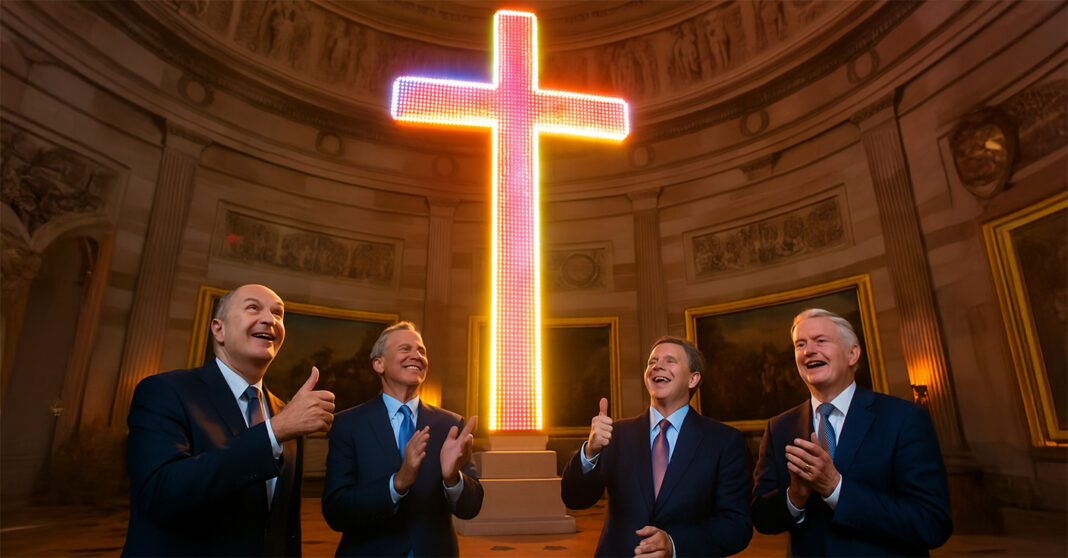Washington, D.C. — The United States Senate has introduced a sweeping new bill designed to “finally bring Christianity out of the shadows and into the light of day,” according to Senator Halford Blint (R–Ark), a man who lists “Crucifix Appreciation” as both a hobby and a political platform.
The Christian Liberation and Full Expression Act of 2025—or CLFEA, for those already designing merch—seeks to address what supporters call “systemic anti-Christian bias,” a term that, when Googled, returns exactly one result: a 2017 Facebook post from a man furious that Starbucks cups didn’t say “Merry Christmas.”

Despite representing over 70% of the U.S. population, dominating every major federal office, and having their own branded section at Hobby Lobby, Christians across America have reportedly spent the last decade feeling deeply marginalized—a condition experts say is commonly triggered by proximity to almond milk, Pride flags, and women with purple hair.
“This legislation is long overdue,” Blint said, standing before a 20-foot LED cross in the Capitol Rotunda. “For too long, Christians have been forced to keep their beliefs to themselves—except when running for office, giving interviews, attending school board meetings, decorating city halls, or lobbying for restrictive reproductive laws.”
The bill would formally recognize Christianity as “a valid and acceptable worldview,” granting Christians new freedoms like:
- Displaying the Ten Commandments in public buildings (again).
- Holding nativity pageants in government-funded skateparks.
- Publicly expressing their beliefs in small towns, large towns, and anywhere that isn’t TikTok.
- Mandating at least one Chick-fil-A per square mile in urban areas.
Critics of the bill have voiced concerns that it might embolden some Christians to resume their time-honored tradition of being in charge of literally everything.
“I just don’t think the dominant religion needs a federal pat on the back,” said University of Phoenix constitutional scholar Dr. Linda Crutchfield. “It’s like giving the sun a flashlight.”
A recent Pew-Parody poll revealed that Americans who identify as both Christian and persecuted also overwhelmingly believe:
- The war on Christmas is real and resulted in the loss of several decorative inflatable reindeer in Akron, Ohio.
- Jesus was born in the Ozarks.
- The media is controlled by coastal druids, probably headquartered in a vegan café in Portland.
Meanwhile, the bill’s passage has prompted lawmakers to suggest further acts of liberation for historically dominant groups, including the Straight Marriage Protection Act and a proposed amendment to recognize “English as the official language of American shouting.”
In Twin Falls, Idaho, local reaction has been predictably biblical. One anonymous pastor from a roadside congregation just south of Jerome declared, “This is a sign of the end times, but the good end times, where we win and get to tell everyone else what music to listen to.”
Meanwhile, over at a Flying J truck stop diner just off I-84, opinions ranged from “Wait, wasn’t it already legal?” to “If they outlaw brunch again, I swear to God, I just learned how to make hollandaise.”
A cashier at the Magic Valley Mall added, “I don’t really follow politics, but if they’re letting Christians be Christian now, maybe I can finally wear my ‘Jesus is My Spotter’ tank top to work without HR getting involved.”
However, opposition in the House is expected from a small coalition of Unitarians, secularists, and the ghost of Thomas Jefferson, who reportedly told onlookers in Monticello:
“I warned you people about this kind of thing,” before promptly unfriending America on Facebook and disappearing in a puff of Enlightenment-era logic.






